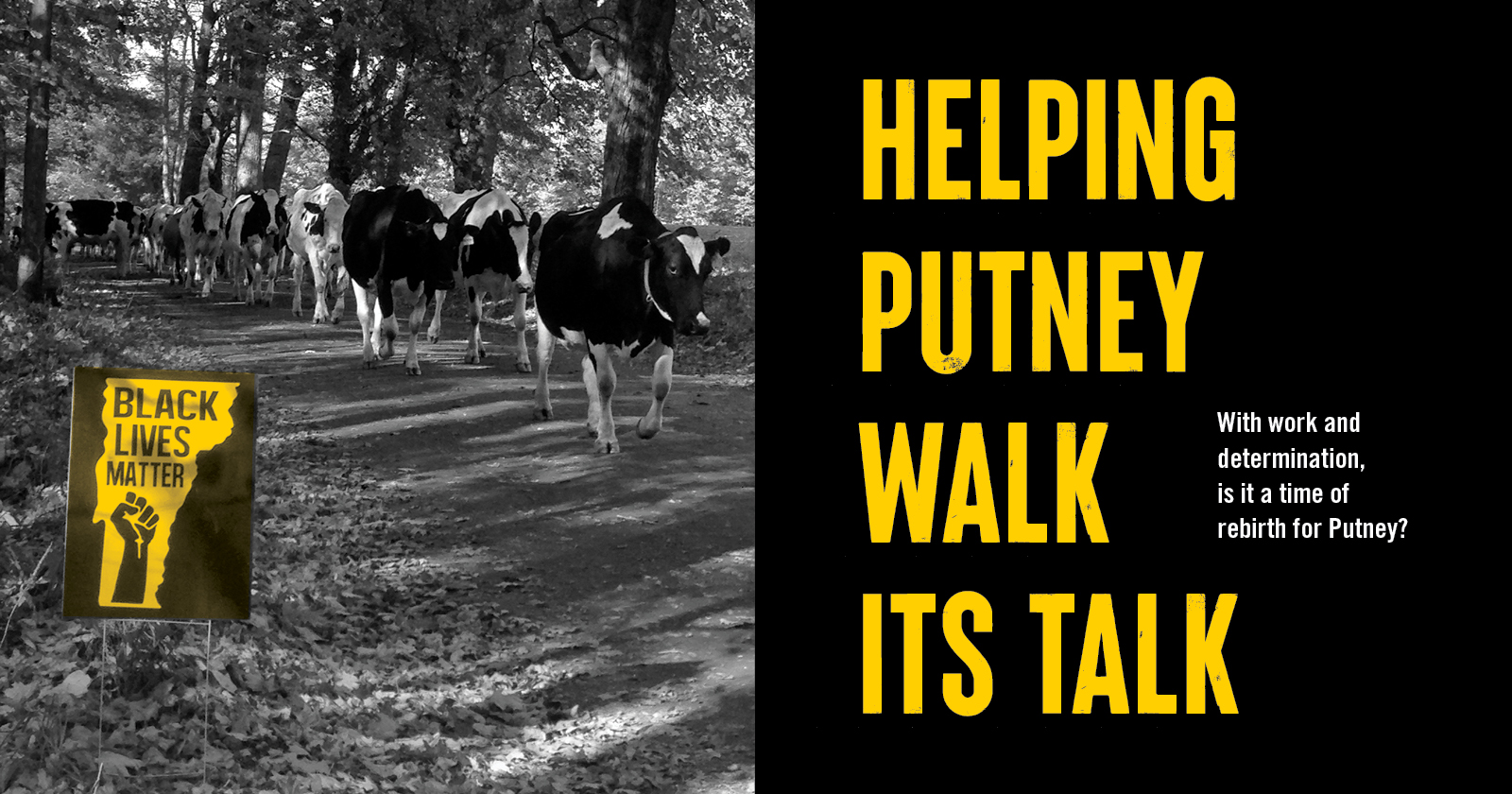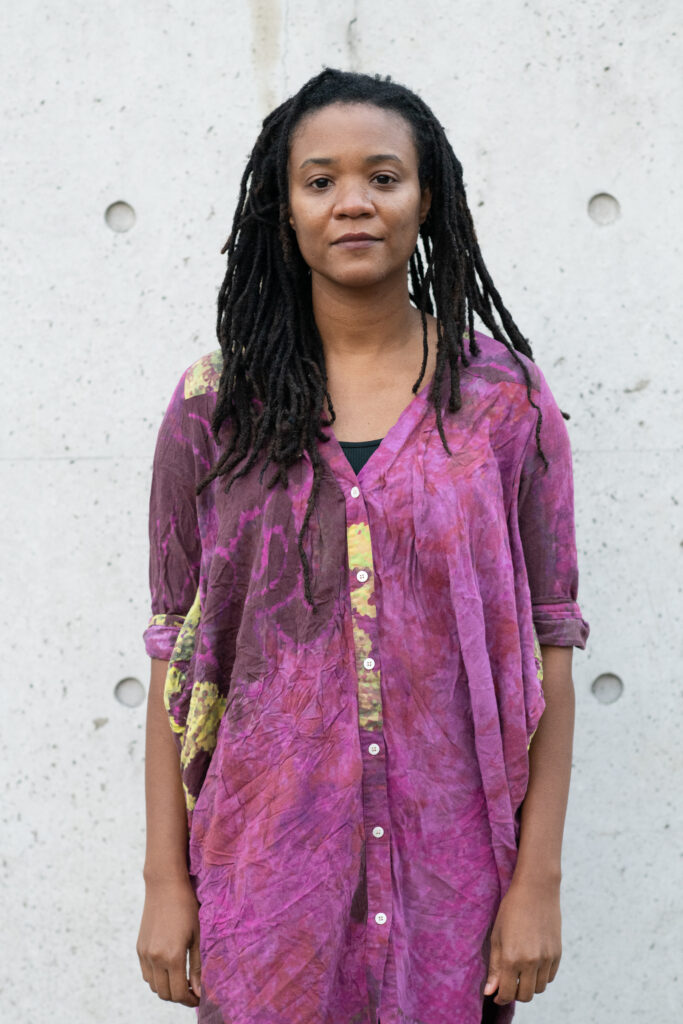
Story by Nkomo Morris ’94, Chair of Diversity, Equity, and Inclusion Committee, The Putney School Board of Trustees
I have never been more desperate for some 2020 hindsight.
I don’t need to list for everyone, again, all of the traumas we’ve all been experiencing either directly, vicariously, or both, since March. The litany of facts, numbers, names, policies, politicians, histories, grievances, murders, funerals, and horrifyingly heartbreaking memories are well known to us all.

But, murder and illness and systemic racism and homophobia and transphobia and misogynoir and classism and sectionalism notwithstanding, some good has come of this year.
Yeah, really.
Contrary to what so many have said, I do not believe that the murders of George Floyd, Breonna Taylor, Ahmaud Arbery, Brayla Stone, and so, so many others brought sudden worldwide attention to the pain Black folx have suffered here and abroad for hundreds of years.
Rather, forced empathy made it happen.
All of those murders, and the countless others before them, compounded with the worldwide trauma of COVID-19, that opened everyone’s eyes to the reality of structural racism. And yes, I say everyone, because plenty of Black folx had their eyes opened as well. Not to the presence of racism, but to their own agency, and sometimes unwilling complicity in it. I can say for myself that I gave up on trying to make my white friends comfortable when I talked about race. And I gave up on trying to make myself comfortable, too.
Warning: I’m going to be a bit vague here. Not because I don’t have specifics in mind, but because I’m not interested in calling people out and because I know that for every person I do call out, several more will feel that I am not talking about them and even myself. But I am. I’m interested in shining a light on what’s been happening in the Putney community since COVID-19 hit.
Before the pandemic was a political flashpoint, it was an empathy builder. We all felt such great sadness, which allowed us to feel the profound sadness of others. We all know racism existed before the pandemic. It certainly wasn’t the first time the world had heard that law enforcement and regular civilians often kill Black people for ridiculous reasons. But suddenly non-Black people could feel it in a new way; it wasn’t abstract. They were primed to feel Black pain, and because we were all stuck at home, we all witnessed so much Black death online almost simultaneously. There was no way to pretend you didn’t know.
Similarly, Black progressives like myself felt invigorated in a new way. Action, many of us realized, meant risk, discomfort, and difficult conversations with colleagues, bosses, on Facebook, and with family members. Personally, I found myself gently confronting fellow teachers who grew angry about the destruction of property in May/June because protesters “should get their points across more peacefully,” as if the civil rights movement hadn’t happened, as if there haven’t been hundreds of years of articles, organizations, books, talks, TV specials, poetry, curricula, movies, and other forms of art dedicated to peacefully decrying structural racism. I lost some friends.
But this year also meant self-education, and remembering that we are all caught in racism’s web. That you can’t point at someone else’s failure, but refuse to do any reading or building yourself.
That you can’t demand folks make big changes but refuse to, for instance, talk to people. That we can’t simultaneously ask peers to broaden their circles of friends while failing to broaden our own. That part of being anti-racist is recognizing that there is something fundamentally discriminatory about attending a tiny private school in a town in Vermont, and that we need to all own our privilege. These are hard truths to recognize. But it’s beautiful that we are recognizing them, some for the first time.
Black connections in the world at large and in the Putney community specifically grew during this time. We’ve had three Black alumnx meetings since September. We’re deciding what we need to do, now that we are a We. We’re building community. It’s been beautiful and moving.
It became clear to more non-Black people than ever before that talk was not enough, that hashtagging and virtue signalling were not enough, that knowing Black people or having travelled to Africa, or even having married a Black person was not enough, that saying “people of color” when you mean to say “Black” is not enough. That feeling uncomfortable saying the word “Black” is a sign of a larger problem in your mind and in society, and until you’ve addressed that, you haven’t done enough. So wearing a Black Lives Matter T-shirt isn’t going to help stop structural racism quite as much as having a good hard look at who attends our birthday parties, our children’s birthday parties, our churches, synagogues, temples, and our board meetings. And yes, I say we, because I, a Black woman, have been guilty of having mostly white friends in the past. And I’m not the only one. That’s no longer the case.
The hard fact is that there is never enough. The work is never done. The fight against structural racism doesn’t end, because embedded in that fight is the fight for equality of all groups, because all groups include Black people.
Those of us most directly involved with the school felt the pressure to DO SOMETHING to fix structural racism on campus. Putney alumnx less directly involved with the school felt an equally strong urgency to DO SOMETHING. No one outside of the school and the board of trustees knew what Putney was doing.
The Putney Post was not enough.
For many, the urgency to end racism RIGHT NOW has dissipated. This is unfortunate, but not surprising. Those of us in it for the long haul are continually re-finding our bearings as the COVID laws change and rearrange.
As the current head of the diversity, equity, and inclusion (DEI) committee on the board of trustees, it’s been my work to help Putney walk its talk. We won’t undo 400 years of slavery in a year or two, during a worldwide crisis. But we are doing what we can, given very limited capacity. Board members work for a living. Certainly Putney staff and students also do quite a bit of work. COVID is happening. Even at the best of times, life at Putney means constant overwhelm with chores and schoolwork and relationship building—even more so for teachers, who must do the same while acting as emotional containers for the students and for their own families.
Just like childbirth is painful for most and fatal for many, but usually leads to the creation of something new to be nurtured, I’m eager to look back and see 2020 as a year of rebirth for The Putney School, and for the United States as a whole. Maybe the world.
Up next: adolescence.

